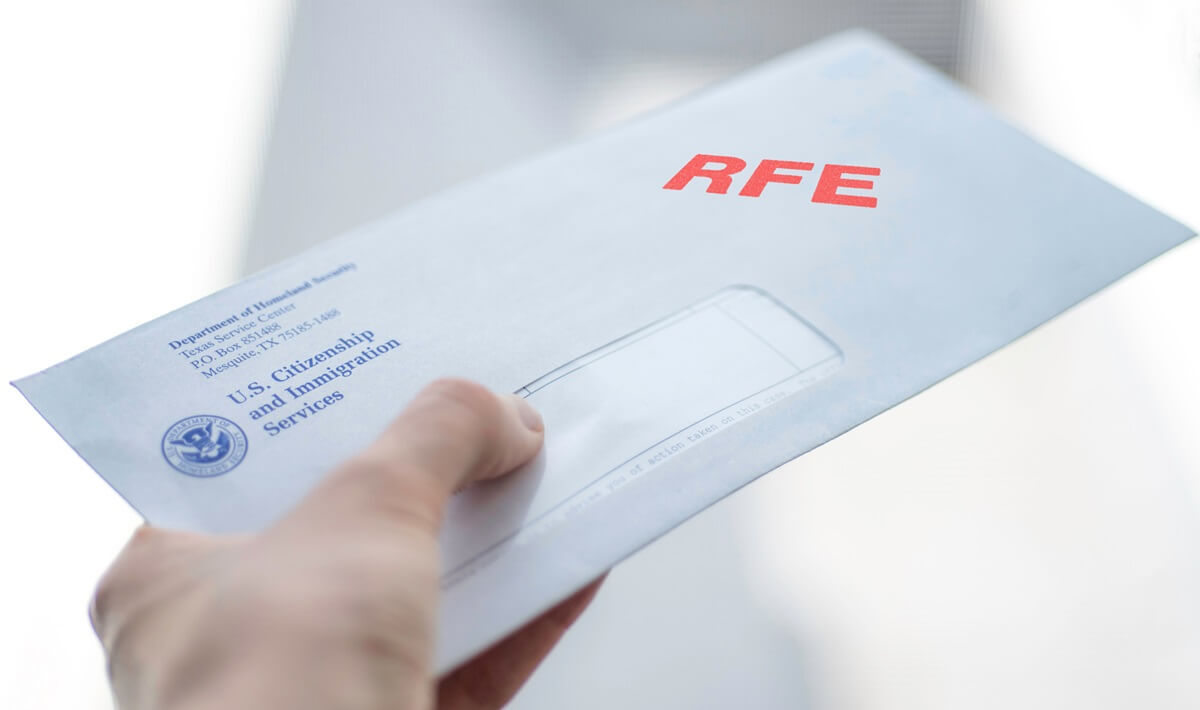
Receiving a denial for your green card application can be a devastating setback, especially if you’ve been looking forward to obtaining lawful permanent residence in the United States. While the process may seem complex and overwhelming, understanding why denials happen and how to address them can significantly improve your chances of success. This article will help you identify some of the most common reasons for green card application denial and what you can do to fix or avoid these issues.
Green Card Denials by the Numbers
Common Reasons for a Green Card Denial
- An Immigrant Visa is Not Available
- Failure to Meet Eligibility Requirements
- Incomplete or Incorrect Forms
- Missing or Insufficient Supporting Documents
- Criminal History
- Failure to Attend Biometrics or Interviews
- Public Charge Concerns
Changes in Circumstances
What to Do if Your Green Card Application Is Denied
Avoiding Problems with Your Application
I-485 Denial Statistics
First, let's take a look at how many people this affects. Each year U.S. Citizenship and Immigration Services (USCIS) denies thousands of green card applications. In fiscal year 2023, data shows that USCIS denied over 9 percent of the 666,693 applications to adjust status (Form I-485) that the agency adjudicated. That's 61,696 denials. Through the first three quarters of fiscal year 2024, USCIS is on pace for just as many green card application denials. This doesn't include the 11 percent that USCIS routinely rejects.
In fact, family-based green application denials run slightly higher. The denial rate runs slightly more than 10 percent during the same period of time. But this is avoidable. You can have a smooth application process.
Common Reasons for Green Card Application Denial
The green card application process can be complex, and even seemingly small mistakes can lead to denial. Understanding the common reasons applications are denied is crucial to avoiding delays and disappointment. Below are some of the most frequent reasons for green card application denial and actionable steps you can take to fix or avoid these issues entirely.
An Immigrant Visa is Not Available
In some cases, a green card application may be denied because an immigrant visa is not immediately available. U.S. immigration laws limit the number of visas issued each year in certain categories. For family-based or employment-based green cards, there may be a waiting period depending on your category and country of origin. If an immigrant visa is not available at the time you apply for adjustment of status, USCIS will likely deny your green card application.
This problem is generally experienced with adjustment of status applications. Individuals in a preference category may mistakenly submit an application before their category is current. Immediate relatives of U.S. citizens don't need to worry about this as there is always a visa available for the spouse, parents, and unmarried children (under 21) of a U.S. citizen.
How to Avoid It: Before filing your application, check the visa bulletin to ensure that an immigrant visa is currently available for your category. If no visa is available, you may need to wait until your priority date becomes current. Staying informed about visa availability can prevent unnecessary denials and help you plan your application timeline more effectively.
Failure to Meet Eligibility Requirements
Each type of green card has specific eligibility requirements. Whether you’re applying through family, employment, or humanitarian grounds, failing to meet the necessary criteria is a leading reason for denial. For example, if you are applying through a family-based petition, USCIS will check if your relationship meets the legal standards, such as proving a valid marriage for immigration purposes.
How to Avoid It: Ensure that you fully understand the eligibility requirements before applying. If you’re unsure, consult with an immigration attorney or use a trusted service like CitizenPath, which specializes in helping individuals navigate these eligibility standards and preparing the application package.
Incomplete or Incorrect Forms
Another reason for green card application denial is submitting incomplete or incorrect forms. Even a small error, such as leaving out certain information can result in significant delays or a denial. Generally, USCIS will give you an opportunity to correct the oversight with a Request for Evidence (RFE). But this puts you in the position of responding to the RFE correctly. Failing to correctly respond to the RFE can result in a denial. USCIS can be very strict about following instructions. What may seem harmless can delay or end your green card process.
How to Avoid It: Before submitting your application, review it multiple times, and consider preparing through an experienced person or service, like CitizenPath. Using a document preparation service ensures that your forms are accurate and complete, greatly reducing the risk of rejection due to technical errors.
Missing or Insufficient Supporting Documents
Supporting documents are essential in proving your eligibility. A lack of required documents such as birth certificates, tax returns, or proof of financial support is a common reason for denial. Additionally, if your supporting documents are incomplete or inconsistent, USCIS may deny your application. Supporting documents includes certified translations. When filing an adjustment of status application, any foreign language documents must be accompanied by a certified translation to English. Include both documents.
How to Avoid It: Create a checklist of all the necessary documents required for your specific application and ensure that each document is up-to-date, accurate, and translated into English if necessary. If you realize you missed something after submitting your application, you may receive a Request for Evidence (RFE), giving you another chance to submit the missing documents. When using CitizenPath, we generate a custom checklist of supporting documents based on your answers.
Criminal History
Certain arrests and criminal offenses can lead to green card application denial. Even minor offenses or past arrests may affect your eligibility. USCIS conducts thorough background checks, and any discrepancies or concerns about your criminal history can result in denial.
How to Avoid It: You need to be completely honest about your history. If you are unable to do so, or worried that it may cause a problem, that's a good indicator it's time to speak to an attorney. An immigration attorney can help you understand how your record might affect your application and whether any exceptions or waivers apply.
Failure to Attend Biometrics or Interviews
USCIS often requires applicants to attend a biometrics appointment and/or interview as part of the green card process. Failure to attend these appointments without properly rescheduling can lead to the denial of your application. USCIS or the U.S. embassy will assume you've abandoned the application and keep the filing fee.
How to Avoid It: Always respond promptly to notices from USCIS or the embassy and keep track of your appointments. If you can’t attend a scheduled appointment, contact them as soon as possible to reschedule.
Public Charge Concerns
The public charge rule applies to individuals applying for a family-based green card. In some cases, it can apply to certain employment-based applicants. USCIS wants to ensure that applicants will not become dependent on government assistance. If USCIS believes you are at risk of becoming a public charge, they may deny your green card application. Even if the green card applicant is independently wealthy, they must overcome the public charge rule.
How to Avoid It: Generally, the public charge rule may be overcome with the petitioner submitting Form I-864, Affidavit of Support. Yet, many qualified people either prepare the form incorrectly or fail to provide ample evidence that they have sufficient resources to sponsor the intending immigrant. CitizenPath's Affidavit of Support Package can help you prepare the form correctly and faciliate your collection of supporting documents.
Changes in Circumstances
I-485 applicants often forget that it is necessary to remain eligible after submitting the application. You must remain eligible throughout the process and until the green card is issued.
Depending on the basis of your application, a variety of factors may affect eligibility. Generally, you must remain in a lawful status. Marriage status, job status, and of course criminal activity can all potentially affect the application.
What to Do if Your Green Card Application Is Denied
Receiving a denial letter can feel like the end of the road, but there are still steps you can take. Here’s what to do if your green card application is denied:
Understand the Reason for Denial
The USCIS officer or consular officer will provide the specific reason for your denial in the notice you receive. Carefully review the letter and identify the exact issue that caused your application's demise.
File an Appeal or Motion to Reopen
If you believe USCIS made a mistake in denying your application, you may have the option to file an appeal or a motion to reopen or reconsider your case. This process requires additional documentation and a strong argument for why the original decision should be overturned. It can also be costly and time-consuming. Consulting with an immigration attorney can help strengthen your appeal.
If you applied for a green card outside the U.S. (i.e. through a U.S. consulate abroad), you will have to ask the consular officer to review your case. If the officer desires, they can get a second opinion from the State Department. However, if the office upholds the decision to deny a green card, there is no appeal available. Generally, you must start the case over again by refiling the I-130 petition.
Reapply
Sometimes the easiest way to move forward after a denial is to correct the issues and reapply. This option is particularly useful if the denial was due to incomplete forms, missing documents, or other fixable errors. Before reapplying, make sure you understand exactly what went wrong the first time and avoid making the same mistake.
If your case is complex or involves criminal history, technical oversights, or other serious issues, it’s a good idea to consult an immigration attorney. They can provide you with legal advice tailored to your situation and help you develop a strategy for success.
Let's Avoid Delays, Rejections and Denials
CitizenPath's approach to immigration is to avoid delays, rejections and denials by helping you submit a strong green card application package from the start.
In fact, we provide affordable, step-by-step guidance through many USCIS immigration applications. Individuals, attorneys and non-profits use the service on desktop or mobile device to prepare immigration forms accurately, avoiding costly delays. By carefully preparing your application, gathering the right documents, and meeting USCIS requirements, you can greatly improve your chances of success. If you need assistance navigating the process, CitizenPath is here to help you every step of the way. Our tools and resources are designed to make the process easier and reduce the risk of mistakes, giving you the best possible chance of approval.
CitizenPath allows users to try the service for free and provides a 100% money-back guarantee that USCIS will approve the application or petition. We provide support for the Immigrant Visa Petition Package (Form I-130), Adjust of Status Package (Form I-485), and several other immigration services.
Want more immigration tips and how-to information for your family?
Sign up for CitizenPath’s FREE immigration newsletter and
SAVE 10%
on our immigration services






